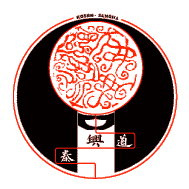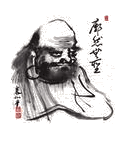Question
Answer from Master Kosen
Soon after his death, I remember very neatly that Roland, Étienne and I were perfectly seeing eye to eye and in harmony in this respect, as for both the European disciples and the Japanese Masters. The latter showed us their greatest respect when learning about our loyalty to Deshimaru. All in all, Sensei requested us to harmonize ourselves with Sotoshu and to keep a good relationship with it, but in no case to follow it or follow the Japanese Zen which, already for Deshimaru, belonged to the past. He said: "the large majority of my disciples who go to Japan mislead thereafter. This is because there they see a Zen of church and hierarchy. That is not the true transmission any more". He added: "You will have to create the Zen of the future starting from my teaching and not to turn this living Zen I taught into a by-product of the Japanese Buddhist church. You are more important and greater than the Japanese Masters..., etc”
You can see that my opinion on this matter was not forged by me only, but I got hold of it from my own Master, who himself already had got hold of it from his Master Kodo Sawaki; this last not wanting at any price to take the risk that his disciple would become a Japanese monk rather than a monk of the transmission, refusing for nearly 40 years to give him the ordination. Kodo was not a member of the Sotoshu. He generally criticized it and always got by on his own, even though he was Godo of the temple of Sojiji for many years.
When Master Deshimaru taught true Zen in France, in 1967, it had been elected to do so only by his Master, Kodo Sawaki. For Sensei, it was the true transmission; there was nothing there to be added. At the beginning of its mission, the only help he received was from the chiefs of Zen Rinzai and Obaku, who were both his friends. It is only later that the Sotoshu, admirers of his work in Occident and in the world, proposed to him its support, both administrative and financial. Why wouldn't he have accepted it? In addition to the financial aspect, it must be understood that as Japanese, it was important for him to be officially recognized by his country. Thereafter, the Sotoshu proposed to him that the ordinations he gave -and there were more and more- were also recorded in Japan, which would give them a much more official character. Sensei accepted. Even afterwards, when the Sotoshu proposed that the oldest disciples who were helping him in his mission should receive the rank of Dendoshi missionaries, Sensei accepted too. It is to be noticed that it was always the Sotoshu which proposed and never Deshimaru who requested. The Sotoshu never asked him to modify his teaching, nor the manner of making the ceremonies or of giving the kyosaku, of sewing and wearing the Kesa, of preparing guen-mai or the manner of eating it, etc. Because the Sotoshu understood his power and his force, they always respected it. The Sotoshu is like the Vatican. One does not say: "My religion is the Vatican". However, owing to the fact that it administrates all the financial, hierarchical, and dogmatic aspects of the Japanese zen Buddhism, it has an immense power in Japan. Sensei always took advantage of it, but he never followed it.
A great error is committed when one wants to compare the transmission and the Sotoshu. Let us speak initially about ordinations. Before Kodo Sawaki and Deshimaru, the situation was very simple: if you were not the son of a monk, you could not receive the ordination, except in very rare cases and with great difficulty. Now that it is fashion among the Japanese prelates to have European or American disciples, things have changed. But what can they teach, apart from their local rules, their infinite hierarchy and their church which is dying in Japan? As for the shiho, it has in the Sotoshu, hardly any more value than a high school diploma and is only one level among so many others in the hierarchy of the professional monk. It is nothing to do with Bodhidharma and Eka, Buddha and Mahakashiapa. It is however about these last ones who Deshimaru spoke to us about a great deal and not about the Sotoshu which is, in short, only one official organization, set up at the end of the Second World War on request of the fascistic government of the time, to control a form of Zen spirituality in Japan. He spoke to us about the transmission and not about the Japanese church.
After his death, once again, the higher Japanese religious authorities, in agreement with the Sotoshu, wanted to certify the mission of Deshimaru as being an event of great importance in the history of Zen. It is within this frame that I was certified, like Étienne and Roland, like official and spiritual successor of Master Deshimaru by the highest Master Zen of the time, Rempo Niwa zenji. It is a historical fact which could never be erased, not even from the files of the Sotoshu itself.
A few years later, I was invited to continue studying with the Sotoshu in a course while taking part in a sesshin. As all my former friends of the AZI were also invited there, I was delighted to be able to assist and participate with them. But I was informed the Master who would teach during this event was no other than Harada Roshi, a man who had spent his life jealous and critic of Kodo Sawaki, and Deshimaru afterwards, and whom I had quarrelled and left his temple angrily because of this, a few years before. It appeared obvious to me that the purpose of this choice was to humiliate weak disciples who had betrayed their Master. How a disciple worthy of being one could have accepted such an invitation without at least cutting off the small finger? It is however exactly what all my former companions did. As for myself, I saw there the sign that this direction was not correct and that Deshimaru would not have accepted that we took part in it.
I think that the Sotoshu is the past and we must think about the Zen of the future. Unfortunately, the disciples of the AZI not relying sufficiently on themselves, or not having the sufficient awakening in themselves, tested the need to still go to beg to the Sotoshu, moreover on a purely individual basis, for a recognition and a capacity of which they were deprived. The Sotoshu took advantage of it by imposing its rules to them, to adapt the temple of Gendronnière and to make them hybrid monks who will try all their life to approach the Japanese model without never really reaching it. And yet if they succeeded... they would only manage to imitate a Zen which has been a long time obsolete now. In any case, they cannot claim any more to follow the Zen of Deshimaru, because they obviously lost the faith, in body and heart, in the transmission of him. As for myself, I have not lost the faith in the fact that recognizing disciples as being monks, nuns and authentic bodhisattvas of the line of the true Buddhism transmitted for 2500 years and of which I am the 83rd patriarch. If there are some who prefer that of the Sotoshu which proposes indeed a completely different vision and offers perhaps a future in its Japanese hierarchy, that they make it at least in recognition of the fact that it does not have anything any more to do with the Zen of Deshimaru, Zen from the "Bodhidharma of modern times".
It is said to me that Roland, Rafou and could be others, gave the ordination again to disciples who had already received it from me or Étienne. They say to them that my ordinations are not valid in Sotoshu since I am not a monk of the Sotoshu, but a Master of the transmission, disciple of Deshimaru. And owing to the fact that the AZI betrayed Deshimaru to turn to the Sotoshu, they also must make them allegiance if they want to be able to practise. This second ordination will be thus not based on faith, like was the first one (one does not forget a historical moment when one has engaged all the sincerity, when one has shaved the cranium, when one bent his Kesa, said goodbye to his family, cut off his last piece of hair and when one received, in the temple of Gendronnière, with the most beautiful ceremony, formulating the vow which would build our future), no, this second ordination which Roland proposes will be based on doubt and rejection. It will turn you into a renegade, to use the appropriate term, and this rather in the form of a pact, if you see what I want to say.
I quote the words of the Buddha: "the support of the vows of aspiration of all the Buddhas is not possible without the blessing of their fundamental vow". If the step that these people make is against the teaching of the Buddha, how to think that they will help the disciples to release themselves when they use the doubt to finally attach them to their own crowd and to add a name to what they believe is their collection of disciples. What a shame! I have a disciple who’s received ordination of bodhisattva and monk of Roland and has followed me for 10 years. Neither the smallest word, nor the smaller doubtful reference has ever been pronounced by this subject. In Argentina, disciples ordered by Michel asked me to give them the ordination again. I always refused saying that they should never doubt their ordination. Why reformulate a vow of a less dimension on our fundamental vow? It is really a very serious error! Do not say to me that they themselves believe in it or that they think of helping their late Master while acting this was.
Mondo On the same theme : Dialogues with Roland
Sotoshu, Roland Rech's response.
Kosen or Roland?
Will you give Roland the chance of explaining to us his point of view?
Is the Sangha of Master Kosen recognised by the Sotoshu of Japan?
The shiho looks to me to be something intimate and to make a celebration of it does not look right to me.
To know more about mondo
You may want to see other themes of this mondo online, or ask your own question : see Mondo online : questions to zen Master Kosen Thibaut


